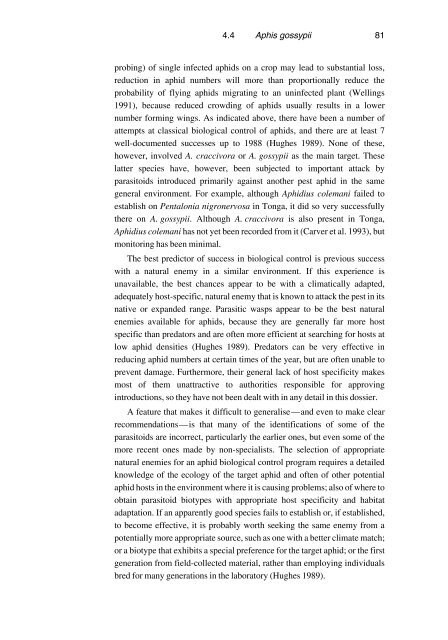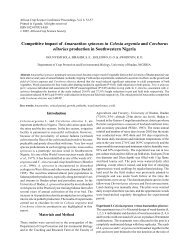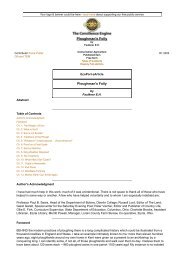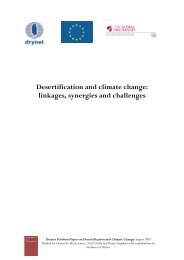- Page 1 and 2:
Biological Control of Insect Pests:
- Page 3 and 4:
ii The Australian Centre for Intern
- Page 5 and 6:
iv 4.5 4.6 4.7 4.8 4.9 Natural enem
- Page 7 and 8:
vi 4.14 4.15 4.16 Phyllocnistis cit
- Page 9 and 10:
1 Abstract Introduction 1 Biologica
- Page 11 and 12:
3 Introduction Introduction 3 Water
- Page 13 and 14:
Figure 1. Introduction 5 integratio
- Page 15:
Introduction 7 necessary those used
- Page 18 and 19:
10 Biological Control of Insect Pes
- Page 20 and 21:
Table 4.1.1 Natural enemies of Agri
- Page 22 and 23:
14 Biological Control of Insect Pes
- Page 24 and 25:
16 Biological Control of Insect Pes
- Page 26 and 27:
18 Biological Control of Insect Pes
- Page 28 and 29: Table 4.2.1 Average figures (days)
- Page 30 and 31: Table 4.2.2 Natural enemies of Anom
- Page 32 and 33: Table 4.2.2 (contÕd) Natural enemi
- Page 34 and 35: Table 4.2.2 (contÕd) Natural enemi
- Page 36 and 37: 28 Biological Control of Insect Pes
- Page 38 and 39: 30 Biological Control of Insect Pes
- Page 41 and 42: Table 3 Order No. of +s 26 1. 41 2.
- Page 43 and 44: 4.4 Aphis gossypii India Myanmar ++
- Page 45 and 46: Host plants Damage 4.4 Aphis gossyp
- Page 47 and 48: 4.4 Aphis gossypii the abundance of
- Page 49 and 50: Table 4.4.1 (contÕd) HYMENOPTERA A
- Page 51 and 52: Table 4.4.1 (contÕd) HYMENOPTERA A
- Page 53 and 54: Table 4.4.1 (contÕd) Parasitoids o
- Page 55 and 56: Table 4.4.1 (contÕd) Parasitoids o
- Page 57 and 58: 4.4 Aphis gossypii 59 Under humid c
- Page 59 and 60: Table 4.4.3 Releases for the biolog
- Page 61 and 62: 4.4 Aphis gossypii 63 that the lyco
- Page 63 and 64: IRAQ ISRAEL 4.4 Aphis gossypii 65 d
- Page 65 and 66: 4.4 Aphis gossypii 67 Lysiphlebus t
- Page 67 and 68: USA USSR 4.4 Aphis gossypii 69 Lysi
- Page 69 and 70: 4.4 Aphis gossypii 71 the posterior
- Page 71 and 72: 4.4 Aphis gossypii 73 Aphidius cole
- Page 73 and 74: 4.4 Aphis gossypii 75 Ephedrus plag
- Page 75 and 76: 4.4 Aphis gossypii 77 as attacking
- Page 77: Diptera 4.4 Aphis gossypii 79 insta
- Page 81: 4.4 Aphis gossypii 83 open fields w
- Page 84 and 85: 86 Biological Control of Insect Pes
- Page 86 and 87: 88 Biological Control of Insect Pes
- Page 88 and 89: Table 4.5.1 Insect predators of Cos
- Page 90 and 91: Table 4.5.1 (contÕd) Insect predat
- Page 92 and 93: 94 Biological Control of Insect Pes
- Page 94 and 95: Table 4.5.2 Introductions for the b
- Page 96 and 97: Table 4.5.2 (contÕd) Introductions
- Page 98 and 99: 100 Biological Control of Insect Pe
- Page 100 and 101: 102 Biological Control of Insect Pe
- Page 102 and 103: 104 Biological Control of Insect Pe
- Page 104 and 105: 106 Biological Control of Insect Pe
- Page 106 and 107: 108 Biological Control of Insect Pe
- Page 108 and 109: 110 Biological Control of Insect Pe
- Page 110 and 111: 112 Biological Control of Insect Pe
- Page 112 and 113: 114 Biological Control of Insect Pe
- Page 114 and 115: 116 Biological Control of Insect Pe
- Page 116 and 117: Table 4.7.2 (contÕd) Diaphorina ci
- Page 118 and 119: 120 Biological Control of Insect Pe
- Page 120 and 121: Table 4.7.3 (contÕd) Natural enemi
- Page 122 and 123: Table 4.7.4 (contÕd) Hyperparasito
- Page 124 and 125: Table 4.7.5 (contÕd) Hyperparsitoi
- Page 126 and 127: 128 Biological Control of Insect Pe
- Page 128 and 129:
130 Biological Control of Insect Pe
- Page 130 and 131:
132 Biological Control of Insect Pe
- Page 132 and 133:
134 Biological Control of Insect Pe
- Page 134 and 135:
136 Biological Control of Insect Pe
- Page 136 and 137:
138 Biological Control of Insect Pe
- Page 139 and 140:
4.9 Dysmicoccus brevipes India 20°
- Page 141 and 142:
Biology 4.9 Dysmicoccus brevipes 14
- Page 143 and 144:
Natural enemies 4.9 Dysmicoccus bre
- Page 145 and 146:
Table 4.9.1 (contÕd) Natural enemi
- Page 147 and 148:
Table 4.9.2 Introductions for the b
- Page 149 and 150:
Table 4.9.2 (contÕd) Introductions
- Page 151 and 152:
4.9 Dysmicoccus brevipes 153 INDONE
- Page 153 and 154:
TRINIDAD USA 4.9 Dysmicoccus brevip
- Page 155 and 156:
4.10 Hypothenemus hampei India 20°
- Page 157 and 158:
Biology 4.10 Hypothenemus hampei 15
- Page 159 and 160:
4.10 Hypothenemus hampei 161 tissue
- Page 161 and 162:
Host plants 4.10 Hypothenemus hampe
- Page 163 and 164:
4.10 Hypothenemus hampei 165 the en
- Page 165 and 166:
4.10 Hypothenemus hampei 167 remain
- Page 167 and 168:
Table 4.10.1 (contÕd) Natural enem
- Page 169 and 170:
Asia 4.10 Hypothenemus hampei 171 C
- Page 171 and 172:
Table 4.10.2 (contÕd) Introduction
- Page 173 and 174:
4.10 Hypothenemus hampei 175 relati
- Page 175 and 176:
4.10 Hypothenemus hampei 177 to 30%
- Page 177 and 178:
4.10 Hypothenemus hampei 179 P. nas
- Page 179 and 180:
4.10 Hypothenemus hampei 181 Planta
- Page 181:
4.10 Hypothenemus hampei 183 Asian
- Page 184 and 185:
186 Biological Control of Insect Pe
- Page 186 and 187:
Table 4.11.1 Development times, and
- Page 188 and 189:
Table 4.11.2 Natural enemies of Leu
- Page 190 and 191:
192 Biological Control of Insect Pe
- Page 192 and 193:
194 Biological Control of Insect Pe
- Page 195 and 196:
4.12 Nezara viridula India Myanmar
- Page 197 and 198:
Biology Damage 4.12 Nezara viridula
- Page 199 and 200:
4.12 Nezara viridula 201 which cons
- Page 201 and 202:
Table 4.12.1 (contÕd) Parasitoids
- Page 203 and 204:
Table 4.12.1 (contÕd) Parasitoids
- Page 205 and 206:
Table 4.12.1 (contÕd) Parasitoids
- Page 207 and 208:
4.12 Nezara viridula 209 attracted
- Page 209 and 210:
Table 4.12.2 Introductions for the
- Page 211 and 212:
Table 4.12.2 (contÕd) Introduction
- Page 213 and 214:
Table 4.12.2 (contÕd) Introduction
- Page 215 and 216:
4.12 Nezara viridula 217 Doubt has
- Page 217 and 218:
4.12 Nezara viridula 219 Africa and
- Page 219 and 220:
BRAZIL 4.12 Nezara viridula 221 par
- Page 221 and 222:
4.12 Nezara viridula 223 parasitisa
- Page 223 and 224:
4.12 Nezara viridula 225 Anastatus
- Page 225 and 226:
THAILAND TONGA USA VANUATU 4.12 Nez
- Page 227 and 228:
4.12 Nezara viridula 229 Gryon sp.
- Page 229 and 230:
4.12 Nezara viridula 231 reproducti
- Page 231 and 232:
4.12 Nezara viridula 233 Ectophasio
- Page 233 and 234:
4.13 Ophiomyia phaseoli India Myanm
- Page 235 and 236:
Biology Host plants 4.13 Ophiomyia
- Page 237 and 238:
Natural enemies 4.13 Ophiomyia phas
- Page 239 and 240:
Table 4.13.1 (contÕd) Natural enem
- Page 241 and 242:
Table 4.13.1 (contÕd) Natural enem
- Page 243 and 244:
EGYPT ETHIOPIA 4.13 Ophiomyia phase
- Page 245 and 246:
4.13 Ophiomyia phaseoli 247 Three a
- Page 247 and 248:
Attempts at biological control 4.13
- Page 249 and 250:
The more important parasitoids 4.13
- Page 251 and 252:
4.13 Ophiomyia phaseoli 253 its hos
- Page 253:
Comment 4.13 Ophiomyia phaseoli 255
- Page 256 and 257:
The Major Invertebrate Pests and We
- Page 258 and 259:
The Major Invertebrate Pests and We
- Page 260 and 261:
The Major Invertebrate Pests and We
- Page 262 and 263:
4.15 Planococcus citri India 20° M
- Page 264 and 265:
Biology Host plants 4.15 Planococcu
- Page 266 and 267:
Table 4.15.1 Predators of Planococc
- Page 268 and 269:
Table 4.15.1 (contÕd) Predators of
- Page 270 and 271:
Table 4.15.1 (contÕd) Predators of
- Page 272 and 273:
Table 4.15.2 Parasitoids of Planoco
- Page 274 and 275:
4.15 Planococcus citri 299 The ency
- Page 276 and 277:
BRAZIL CHILE CHINA CUBA CYPRUS FRAN
- Page 278 and 279:
ISRAEL 4.15 Planococcus citri 303 R
- Page 280 and 281:
4.15 Planococcus citri 305 When the
- Page 282 and 283:
Table 4.15.4 Introductions for the
- Page 284 and 285:
Table 4.15.4 (contÕd) Introduction
- Page 286 and 287:
Biology of important natural enemie
- Page 288 and 289:
4.15 Planococcus citri 313 Diomus p
- Page 290 and 291:
Comments 4.15 Planococcus citri 315
- Page 292 and 293:
4.16 Trichoplusia ni India 20° Mya
- Page 294 and 295:
Host plants 4.16 Trichoplusia ni 31
- Page 296 and 297:
4.16 Trichoplusia ni 321 describing
- Page 298 and 299:
Table 4.16.1 (contÕd) Parasitoids
- Page 300 and 301:
Table 4.16.1 (contÕd) Parasitoids
- Page 302 and 303:
Table 4.16.1 (contÕd) Parasitoids
- Page 304 and 305:
Table 4.16.1 (contÕd) Parasitoids
- Page 306 and 307:
Table 4.16.2 (contÕd) Some predato
- Page 308 and 309:
Table 4.16.2 (contÕd) Some predato
- Page 310 and 311:
4.16 Trichoplusia ni 335 Introducti
- Page 312 and 313:
4.16 Trichoplusia ni 337 Table 4.16
- Page 314 and 315:
Table 4.16.6 Natural enemies of Tri
- Page 316 and 317:
4.16 Trichoplusia ni 341 It was sug
- Page 318 and 319:
4.16 Trichoplusia ni 343 13.85 days
- Page 320 and 321:
4.16 Trichoplusia ni 345 Voria rura
- Page 322 and 323:
4.16 Trichoplusia ni 347 when 2nd o
- Page 324 and 325:
5 References 349 Abasa, R.O. 1975.
- Page 326 and 327:
References 351 Alfaro, F., Garcia-M
- Page 328 and 329:
References 353 Argyriou, L.C. 1970.
- Page 330 and 331:
References 355 Ayoub, M.A. 1960. Ph
- Page 332 and 333:
References 357 Barrera, J.F., Gomez
- Page 334 and 335:
References 359 Beattie, G.A.C. and
- Page 336 and 337:
References 361 Berkani, A. 1995. Re
- Page 338 and 339:
References 363 Boling, J.C. and Pit
- Page 340 and 341:
References 365 Brun, L.O., Marcilla
- Page 342 and 343:
References 367 Cantrell, B.K. 1984.
- Page 344 and 345:
References 369 Cenda-a, S.M., Gabri
- Page 346 and 347:
References 371 Chien, C.C., Chu, Y.
- Page 348 and 349:
References 373 CIE 1985. Distributi
- Page 350 and 351:
References 375 Compere, H. 1939. Me
- Page 352 and 353:
References 377 Crouzel, I.S. and Sa
- Page 354 and 355:
References 379 De Oliveira Filho, M
- Page 356 and 357:
References 381 Ding, Y., Li, M. and
- Page 358 and 359:
References 383 Elliott, N.C., Frenc
- Page 360 and 361:
References 385 Ferreira, A.J. and B
- Page 362 and 363:
References 387 Foerster, L.A., Quei
- Page 364 and 365:
References 389 Garcia, A. and Barri
- Page 366 and 367:
References 391 Godin, C. and Boivin
- Page 368 and 369:
References 393 Guido, A.S. and Ruff
- Page 370 and 371:
References 395 Hayat, M. and Lin, K
- Page 372 and 373:
References 397 Hofmaster, R.N. 1961
- Page 374 and 375:
References 399 Huo, S.T., Wei, Z.G.
- Page 376 and 377:
References 401 Jackson, C.G., Neema
- Page 378 and 379:
References 403 Jones, W.A. 1979. Th
- Page 380 and 381:
References 405 Kester, K.M., Smith,
- Page 382 and 383:
References 407 Komazaki, S. 1993. B
- Page 384 and 385:
References 409 Kushida, T., Katagir
- Page 386 and 387:
References 411 Lee, S.C., Yoo, J.K.
- Page 388 and 389:
References 413 Liljesthršm, G.G. 1
- Page 390 and 391:
References 415 Lo, K.C. and Chiu, S
- Page 392 and 393:
References 417 Manjunath, T.M. 1972
- Page 394 and 395:
References 419 McCutcheon, G.S. and
- Page 396 and 397:
References 421 Michael, P.J. 1981.
- Page 398 and 399:
References 423 Moreira, G.R.P. and
- Page 400 and 401:
References 425 Nakahara, M. and Kai
- Page 402 and 403:
References 427 Nixon, G.E.J. 1937.
- Page 404 and 405:
References 429 Oncuer, C. and Bayha
- Page 406 and 407:
References 431 Panis, A. 1977. Pseu
- Page 408 and 409:
References 433 Pe-a, J.E., Gilbin-D
- Page 410 and 411:
References 435 Prinsloo, G.L. 1985.
- Page 412 and 413:
References 437 Reddy, K.B. and Bhat
- Page 414 and 415:
References 439 Roepke, W. 1912. On
- Page 416 and 417:
References 441 Saha, J.L. and Agarw
- Page 418 and 419:
References 443 Schlinger, E.I. and
- Page 420 and 421:
References 445 Shi, D.S. 1984. Stud
- Page 422 and 423:
References 447 Singh, R. and Bhatt,
- Page 424 and 425:
References 449 Sinha, T.B. and Sing
- Page 426 and 427:
References 451 Soldevila, A.I. and
- Page 428 and 429:
References 453 Starù, P. and Ghosh
- Page 430 and 431:
References 455 Steinkraus, D.C., Sl
- Page 432 and 433:
References 457 Swezey, O.H. 1931. R
- Page 434 and 435:
References 459 Tewari, G.C. and Sar
- Page 436 and 437:
References 461 Tranfaglia, A. 1979.
- Page 438 and 439:
References 463 Ujiye, T. 1990. Stud
- Page 440 and 441:
References 465 van Steenis, M.J. 19
- Page 442 and 443:
References 467 Vinson, S.B. and Sto
- Page 444 and 445:
References 469 Waterston, J. 1915.
- Page 446 and 447:
References 471 Wilson, C.G. 1991. N
- Page 448 and 449:
References 473 Xu, C.F., Xia, Y.H.,
- Page 450:
References 475 Zhang, X.L. 1987. Pr
- Page 453 and 454:
478 Biological Control of Insect Pe
- Page 455 and 456:
480 Biological Control of Insect Pe
- Page 457 and 458:
482 Biological Control of Insect Pe
- Page 459 and 460:
484 Biological Control of Insect Pe
- Page 461 and 462:
486 Biological Control of Insect Pe
- Page 463 and 464:
488 Biological Control of Insect Pe
- Page 465 and 466:
490 Biological Control of Insect Pe
- Page 467 and 468:
492 Biological Control of Insect Pe
- Page 469 and 470:
494 Biological Control of Insect Pe
- Page 471 and 472:
496 Biological Control of Insect Pe
- Page 473 and 474:
498 Biological Control of Insect Pe
- Page 475 and 476:
500 Biological Control of Insect Pe
- Page 477 and 478:
502 Biological Control of Insect Pe
- Page 479 and 480:
504 Biological Control of Insect Pe
- Page 481 and 482:
506 Biological Control of Insect Pe
- Page 483 and 484:
508 Biological Control of Insect Pe
- Page 485 and 486:
510 Biological Control of Insect Pe
- Page 487 and 488:
512 Biological Control of Insect Pe
- Page 489 and 490:
514 Biological Control of Insect Pe
- Page 491 and 492:
516 Biological Control of Insect Pe
- Page 493 and 494:
518 Biological Control of Insect Pe
- Page 495 and 496:
520 Biological Control of Insect Pe
- Page 497 and 498:
522 Biological Control of Insect Pe
- Page 499 and 500:
524 Biological Control of Insect Pe
- Page 501 and 502:
526 Biological Control of Insect Pe
- Page 503 and 504:
528 Biological Control of Insect Pe
- Page 505 and 506:
530 Biological Control of Insect Pe
- Page 507 and 508:
532 Biological Control of Insect Pe
- Page 509 and 510:
534 Biological Control of Insect Pe
- Page 511 and 512:
536 Biological Control of Insect Pe
- Page 513 and 514:
538 Biological Control of Insect Pe
- Page 515 and 516:
540 Biological Control of Insect Pe
- Page 517 and 518:
542 Biological Control of Insect Pe
- Page 519 and 520:
544 Biological Control of Insect Pe
- Page 521 and 522:
546 Biological Control of Insect Pe
- Page 523:
548 Biological Control of Insect Pe






